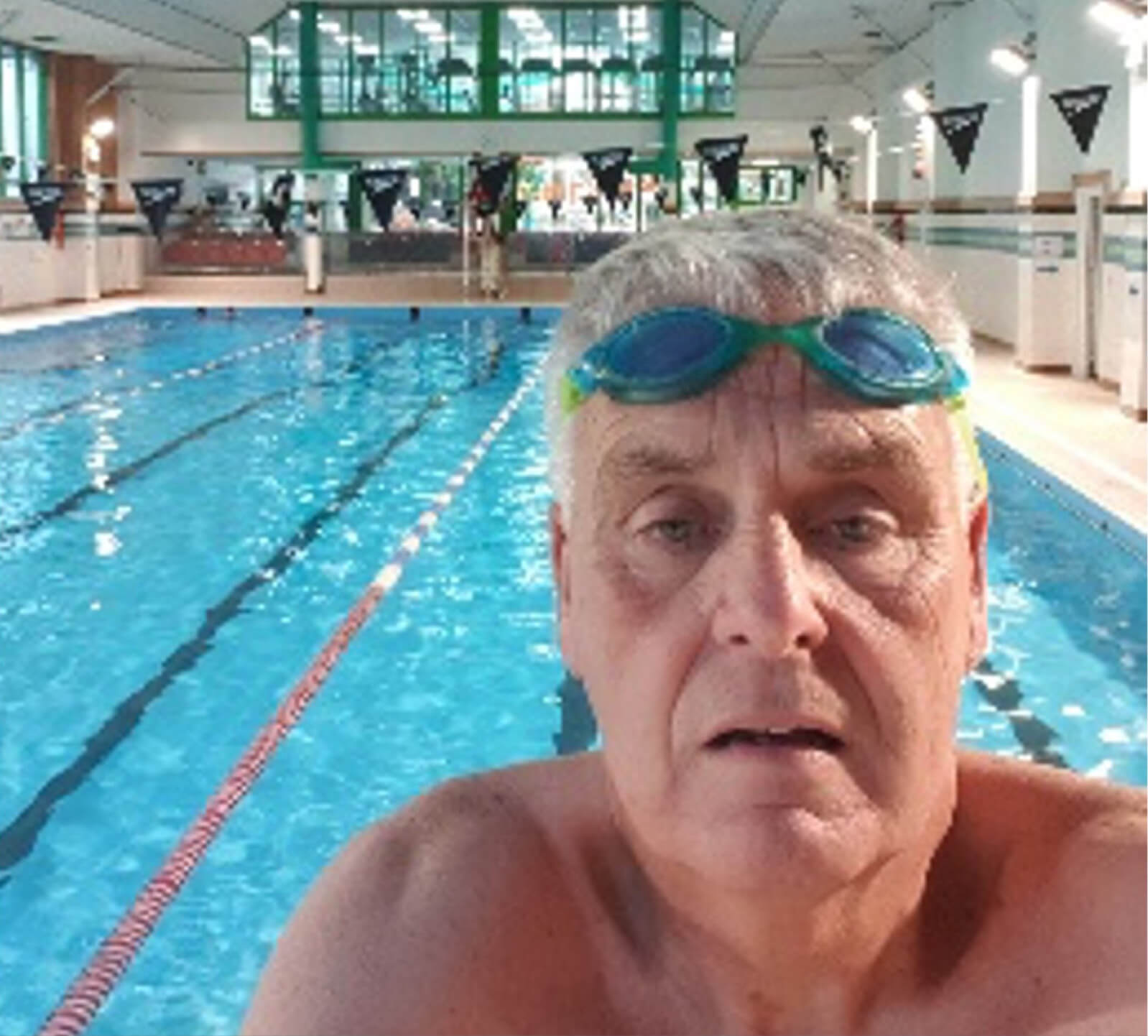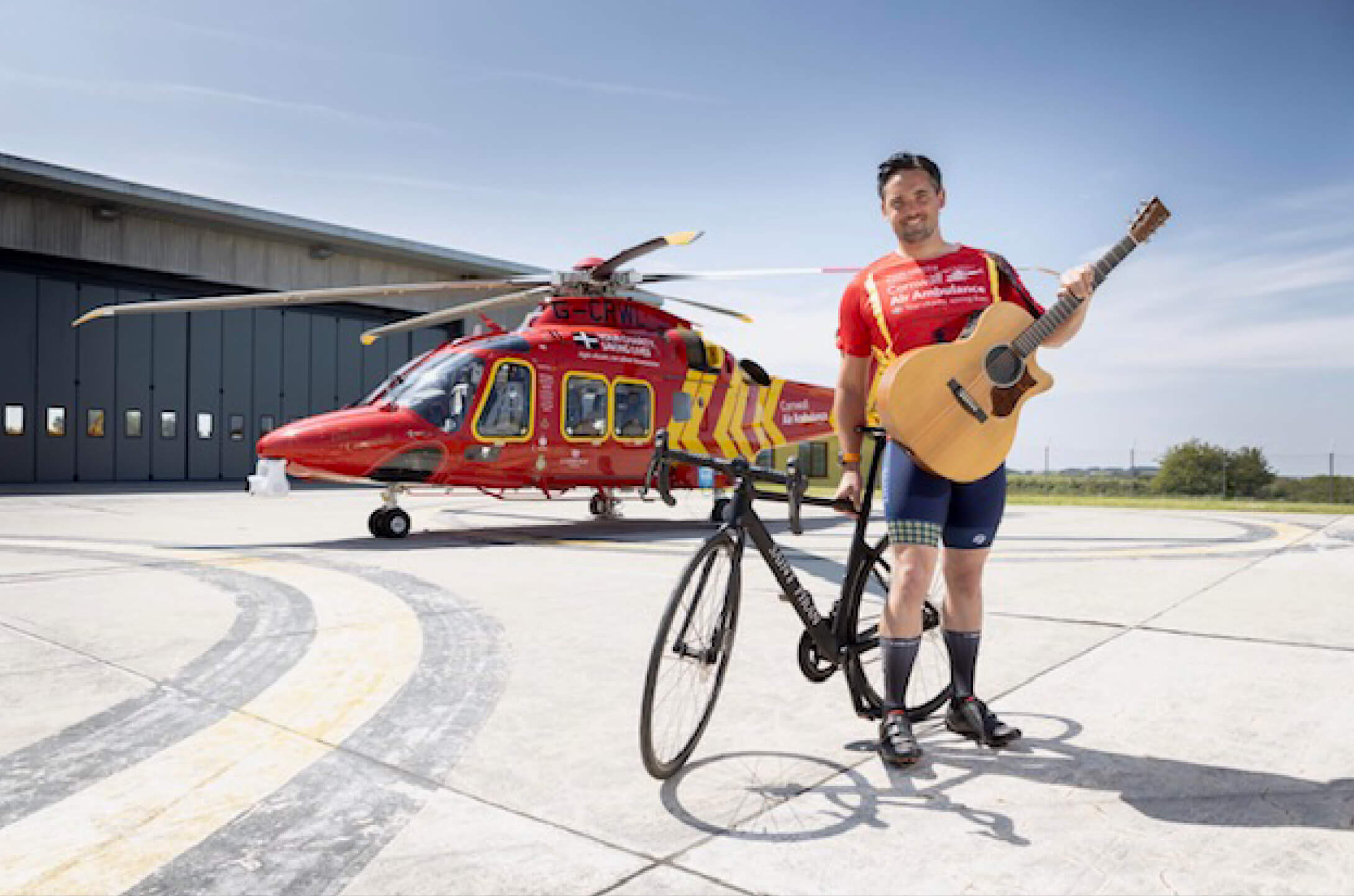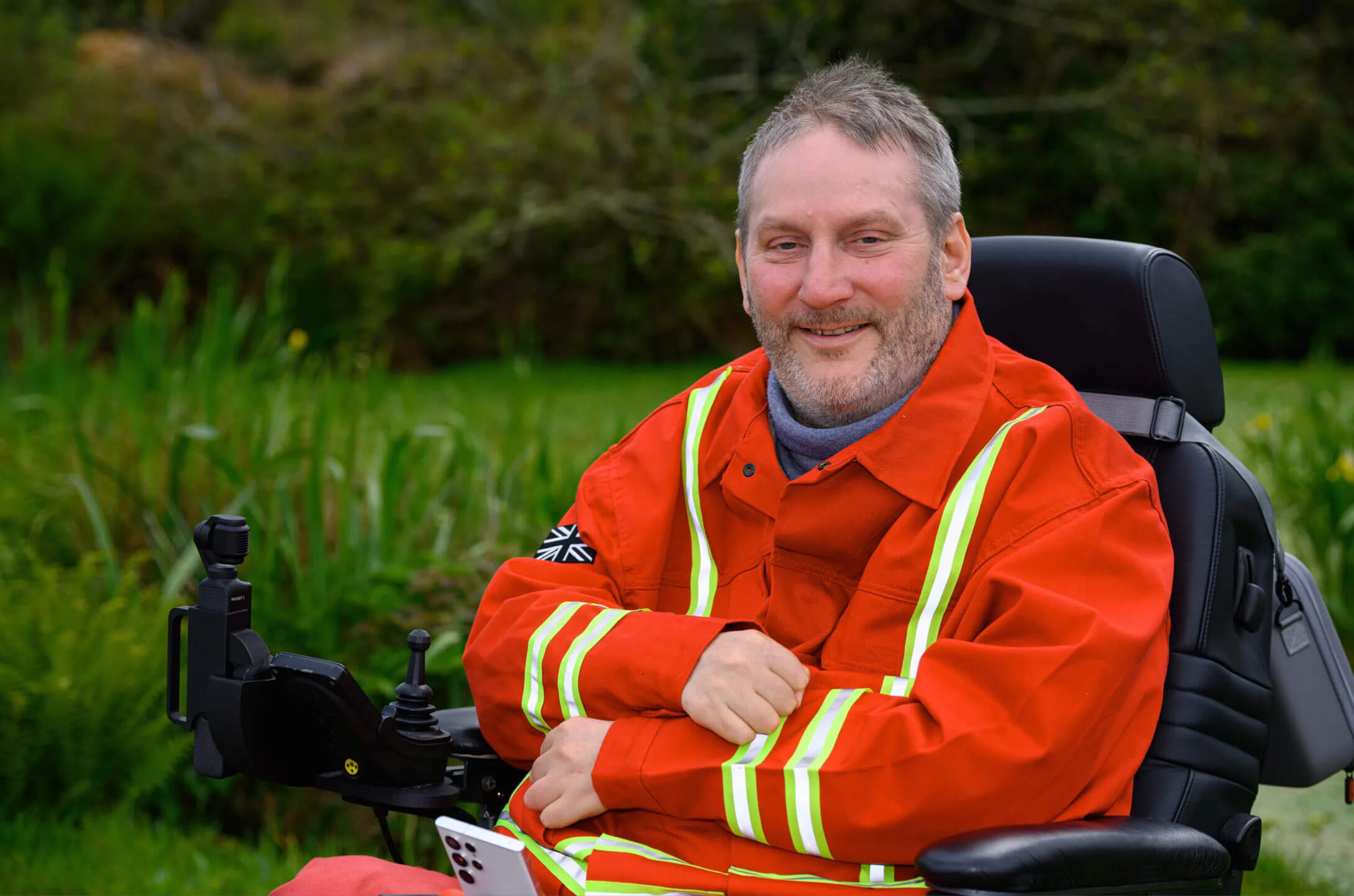Hello
Tim Bunting, Chief Executive
Hello and welcome to this very special edition of Airtime, during what is a really exciting time for Cornwall Air Ambulance.
2023 has been a busy year, both in terms of mission numbers and advancements for your charity. We enjoyed series two of Cornwall Air 999 on our screens, opened a brand-new Operations Wing, and welcomed several new pilots to the crew. Now we embark on a really exciting mission to bring a second AW169 helicopter to Cornwall and the Isles of Scilly, with the launch of our Heli 2 Appeal.
Read more
Owning a second high-specification and technologically advanced aircraft will allow us to attend more missions by air, and ultimately save more lives. But we can’t do this without you, our dedicated supporters, who help to keep us flying.
I hope you enjoy hearing from your aircrew on the importance of an additional helicopter, about our brand new Christmas animation, and how your support makes a lifesaving difference.
Thank you.
SAVING MORE LIVES
Steve Garvey, Air Operations Officer
Owning a single medically advanced AW169 helicopter has undoubtedly meant that we have saved more lives. Since its arrival in 2020, we’ve been tasked to over 3,000 missions. That’s 3,000 families who we have been able to help when they needed us the most. We want to be able to help even more people.
The AW169 has made a huge difference to our daily operation. It’s a fast aircraft, is highly equipped, has the latest technology, and provides my clinical crew with the space they need for all their specialist equipment. It also provides us with 360-degree access to the patient, meaning more treatment inside the helicopter and en-route to hospital. The AW169 has high weight limits and can carry a large amount of fuel, meaning we can carry out back-to-back missions.
Owning a second, high capability helicopter will unlock further clinical opportunities for us. It means we will always have a top specification HEMS aircraft ready and available to respond to medical emergencies, even during maintenance periods. It will increase our amount of aircraft availability each year, increasing the number of missions we can carry out by air. By having two AW169s at our disposal, we can ensure that we attend all call outs on the most capable aircraft for our highly skilled paramedics, doctors and pilots.
Next generation helicopters like this don’t come cheap. We are now launching the Heli 2 Appeal, to raise the remaining £2.85million needed to purchase this second helicopter for our patients.
I hope you’ll join us on the mission to bring a second AW169 to Cornwall and the Isles of Scilly.
On behalf of all the aircrew, thank you for your continued support.

At the centre of everything we do is the people who need us the most in their hour of need, our patients, and being able to provide them with the best possible critical care service across Cornwall and the Isles of Scilly.
We support over 1,000 patients who are seriously ill or injured every year, but there is scope to reach even more people by air when they need us most with the purchase of a second helicopter.
Currently when your AW169 helicopter is undergoing its annual maintenance, we lease a backup AW109 aircraft, so that we can continue to be operational and responding to critical incidents. But the AW109 is not as advanced or capable.
With the AW169 being the best aircraft to fit the needs of the service we provide, we are now planning to purchase a second one of our own. This will ensure resilience, by being able to provide a consistent service on the best possible aircraft type all year round.
This will be the first time that Cornwall Air Ambulance has owned two aircraft. As a result, this provides us with more flexibility and will help to further futureproof the charity’s operations. It means carrying the best possible crew, with the best possible equipment, on the best possible aircraft, on all missions. And ultimately, it means we can attend even more patients by air.
Next generation helicopters like this don’t come cheap. We are now launching the Heli 2 Appeal, to raise the remaining £2.85million needed to purchase this second helicopter for our patients.
I hope you’ll join us on the mission to bring a second AW169 to Cornwall and the Isles of Scilly.
On behalf of all the aircrew, thank you for your continued support.
Why I’m looking forward to our second helicopter
“The AW169 helicopter is by far the most powerful and capable aircraft ever used by Cornwall Air Ambulance” says pilot Adam.
It has many benefits both in terms of aviation and from a clinical perspective, and is the best suited aircraft for the critical care service that we provide. I’m very lucky that I get to fly it – but more importantly, this helicopter allows us to provide the very best solution possible for our clinical teams as they provide lifesaving support to those people who are critically ill or injured across Cornwall and the Isles of Scilly.
Being able to provide the best possible care and the best possible outcome for the patient is the most important part of our service. The AW169 provides the clinical crew with 360-degree access to the patient and more room to treat them within the helicopter itself. Being a powerful aircraft with high weight limits, it means not only can we carry more fuel, so we can carry out back-to-back missions, but also the ability to carry a vast range of equipment, drugs, and lifesaving tools. When we need to airlift a child, it also means that there is space and the weight capacity to take a parent too, which we know can make all the difference. And it’s fast, flying at around 135 knots (155mph), meaning we can reach the scene or the hospital quickly.
We not only serve the people of Cornwall but also the Isles of Scilly, and we are the only air ambulance service in the UK which crosses a wide stretch of ocean to reach patients. Safety is of course paramount, both for the patient and for our aircrew. Again, the second AW169 will have a life raft system and flotation devices, maximising safety when flying over water.
What I’m really looking forward to about owning two of these aircraft is that our availability factor will go up. The AW169 requires planned, and sometimes unplanned, maintenance. Owning two will mean that we can ensure we’re always operational on the best specification of aircraft (where the unpredictable Cornish weather allows of course), rather than relying on a less capable secondary aircraft or only being able to respond via road on a rapid response vehicle.
It will also mean greater safety for the aircrew and everyone who we work with, as the pilots will only be required to train on one type of helicopter. Having to train on two aircraft models, which operate very differently, comes with a risk factor. And sometimes we have to swap between the two at very short notice. Owning two AW169s will eliminate that risk in every environment that we work in.
Importantly, having two AW169s also means that whenever we are online we are able to fly in the hours of darkness. Currently during maintenance periods we are only operational in darkness via the rapid response vehicles, as the rented backup aircraft is not cleared for night flying. The AW169 uses a specialist
Synthetic Vision System, powerful searchlights and advanced mapping systems. This means that for the first time in our history we can be ready to respond by air 19 hours a day, 365 days a year, provided the weather allows.
As Unit Chief Pilot, I’m excited to be part of this groundbreaking step forward in our service provision. It was always a dream of mine to become a pilot with Cornwall Air Ambulance, and I’m proud to be at the forefront of providing even further enhanced critical care for our patients.
What extra benefits will a second AW169 helicopter give us?
- Enables us to fly hundreds of extra missions, helping save more lives across Cornwall and the Isles of Scilly
- Due to the extreme demands on our aircraft, a second helicopter will significantly boost our resilience and availability
- It provides us with the versatility to operate two helicopters simultaneously during peak demand periods
How we look after your AW169 helicopter
Helicopters are highly sophisticated, complex machines which require regular routine maintenance. Every morning, the pilot will check the aircraft’s oil levels, landing gear, general wear and tear, and will make sure there is no damage before it goes online at 7am. But much like how your car needs an annual service, so does a helicopter. Rather than getting it back the same day though, the service can take weeks or even months depending on the depth of maintenance that is required.
As a Helicopter Emergency Medical Service (HEMS) aircraft it is started up quickly, and frequently flown at high speeds for short periods of time, getting the crew to the scene or the patient to hospital. This can cause increased metal fatigue and in some cases component or system failures. The aircraft often lands on beaches and varied terrains around the coast and is therefore exposed to sand, salty sea air and rain which can be abrasive and/or corrosive to the aircraft, especially its engines. This type of operation all contributes to the amount of maintenance carried out on the aircraft at both Newquay, prior to its daily operation, and during its maintenance checks with Castle Air.
The AW169 visits Castle Air Ltd annually, our helicopter maintenance partner, where the aircraft is stripped, inspected and reassembled. The annual maintenance is a rigorous process. The engineers carry out in depth inspections on; the two engines, the rotor systems, the fuel systems, the hydraulics, the avionic systems, and the undercarriage. After such an in-depth maintenance check the aircraft then undergoes extensive ground and flight tests before it is released back to Cornwall Air Ambulance.

It was really reassuring to know they were coming and we’d get there quickly.

13-year-old Lucas Buckley was walking to the local shop after school when he was involved in a hit-and-run collision in north Cornwall.
He’d been playing football with friends in St Teath when they decided to go and buy sweets. Lucas was hit by a passing car and was knocked to the ground, breaking both bones in his lower leg.
Cornwall Air Ambulance was called to the scene, with critical care paramedics Paul Maskell and Pete Storer on board your AW169 helicopter.
Lucas was given ketamine for the pain and his leg was splinted before he was airlifted to Treliske. He was later transferred to Bristol Children’s Hospital, due to concerns about possible infection, and he underwent surgery.
Dad Gary said: “It speeded everything up, knowing how highly trained they are, it was really reassuring for us knowing we had that support. You never think it’s going to be you or your children, but the fact it came out and he got to hospital quicker was great.”
Mum Paula added: “It was really reassuring as being in St Teath, we’re at least an hour away from hospital. He was in so much pain, he was crying with the pain, so it was really reassuring to know they were coming and we’d get there quickly. I think it’s vital to have an air ambulance service. We’re very, very lucky down here to have it. Like us, you never know when it’s going to happen to you or your family. You don’t know what’s around the corner, and you never know if you’re going to need it.”
JOIN JESS ON HER JOURNEY
THIS CHRISTMAS
We are releasing a very special animation this Christmas, called Jess’ Journey. The animation is based on a true story about a young girl called Jess who watches as her brother Ned is taken away to hospital by Cornwall Air Ambulance.
The animation sees our critical care paramedics arrive in your AW169 helicopter at the Royal Cornwall Hospital to pick Ned up and transfer him to Bristol Royal Hospital for Children.
Ned’s sister Jess watches on as her special brother is whisked away into the skies, receiving lifesaving support. The animation follows Jess as she comes to terms with what’s happening to her brother – and responds in the most spectacular way.
The real story behind Jess’ Journey
The story of Jess’ Journey is based on patient Ned and his family.
Ned was just seven years old when he suffered a brain bleed and needed specialist care, after complaining of a headache at school.
He was rushed to Treliske that night and needed to be taken to the Bristol Royal Hospital for Children for surgery. Cornwall Air Ambulance was tasked to carry out the inter-hospital transfer, getting Ned there quickly and saving vital hours of travel time.
Ned underwent five surgeries and was in a coma for seven days. Due to Covid restrictions, only one person could be with him at any time. That meant his five-year-old sister Jess couldn’t see her big brother.
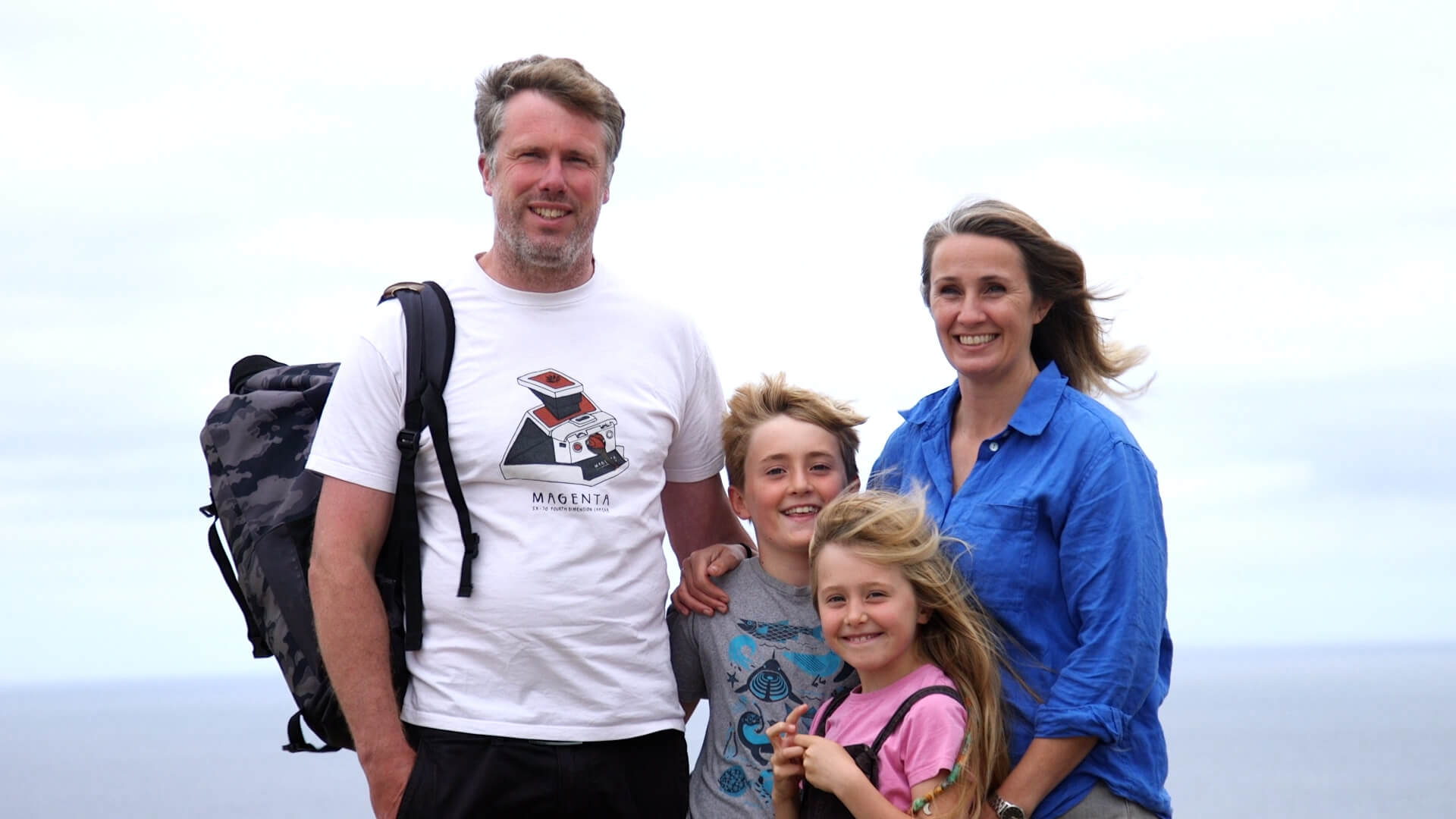
Mum Abi said: “The air ambulance helped to save Ned’s life, we will never know the difference those two hours meant, but we will forever be grateful for their part in saving his life.”
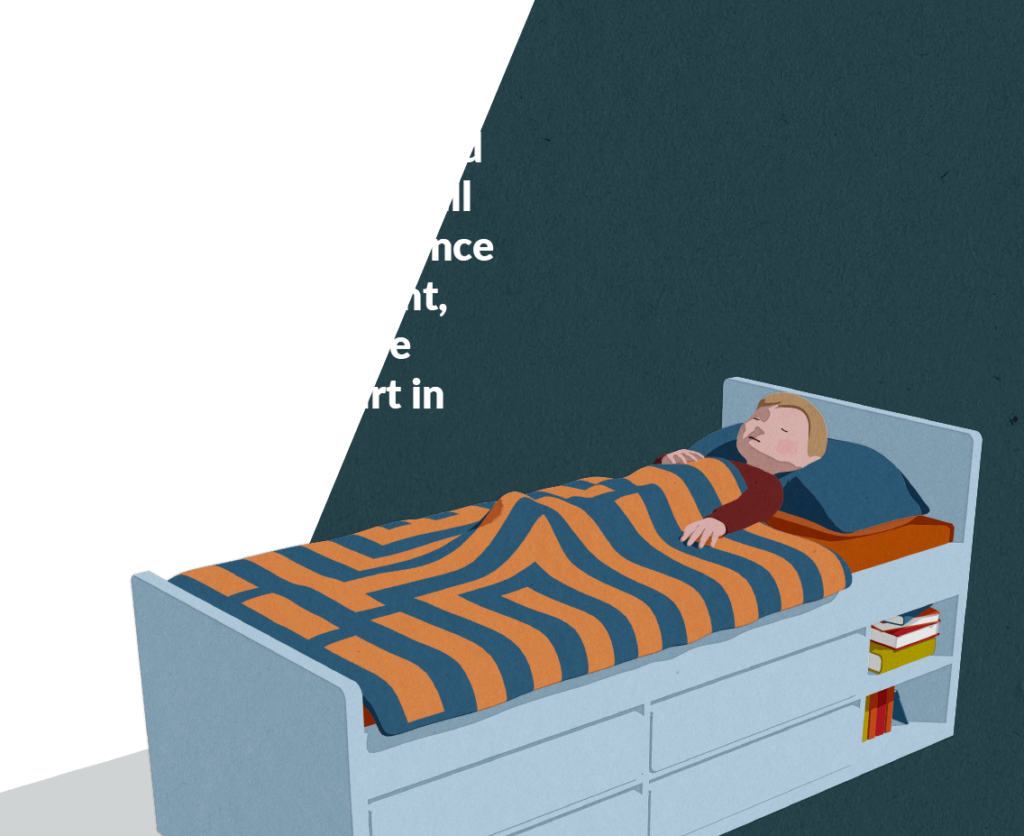
Want to donate to our #heli2 appeal
Your donation this Christmas will support our #heli2 appeal, enabling us to buy your vital second lifesaving helicopter at the end of next year.
Owning a second high-capability aircraft will boost our resilience and availability, meaning we can respond to more patients by air and save more lives.
Any donation you are able to make will be instantly doubled, thanks to the amazing support of a small group of donors*.

*Any donation you are able to make this festive season, up to the value of £150k, or until the campaign ends on 31/12/23, will be doubled thanks to a small group of match funders.
SIGN UP FOR airtime MAGAZINE
Want to receive an Airtime Magazine?
Sign up below and we’ll send one to you.
Meet John Griffin
He is swimming ONE MILLION METRES to raise money for the HELi2 appeal
The 70-year-old is swimming 4,000 metres a day (160 lengths), six days a week, for a whole year to reach the target. And he’s aiming to raise £1million for your charity!
“I’ve worked with air ambulances in my previous existence when I was working in London, I grew up in the Lake District and the air-sea rescue helicopter used to work with the mountain rescue teams I was associated with. Living in a rural community, if you’re off the beaten track you’re not going to get a road ambulance to you quickly, and the ability to get you to hospital quickly in an air ambulance is so important.”
John is completing his challenge at Newquay Leisure World and Truro Leisure Centre, both run by leisure operator GLL.
Meet Tom Cary
Cornish country singer Tom Cary is raising money for the HELi2 appeal by taking on a ‘Country across the Country’ challenge.
Tom, from Truro, will be cycling from John O’ Groats to the Isles of Scilly and each evening will stop off to perform a gig at a different pub or venue.
Setting off on 24th July, Tom’s challenge will take around 20 days to complete with 20 different gigs along the way, featuring a brand-new song called ‘Cowboy Coming Home’ which is being recorded especially for the challenge.
Tom’s venture will finish with a final show taking place on 12th August on the Isles of Scilly.
“As soon as you mention Cornwall Air Ambulance to somebody, they love it. And Cornwall being the first one in the country is pretty special. It was a no-brainer to support the charity, I’m a big advocate for water and coastal safety, that coupled with the fact I’ve spent a lot of time in the sea, rowing, swimming and surfing, I’ve seen them go out on calls numerous times and it’s incredible to actually watch it. It’s almost like an invisible safety net that people have here in Cornwall, and they know it’s there, it’s that mental security knowing that it’s there.”
Photos: ©Exposure Photo Agency
Meet Steven Webb
Airlifted patient Steven Webb is embarking on a 500-mile coastal challenge in his wheelchair to raise money for the HELi2 appeal.
Steven was left tetraplegic following a swimming pool accident in 1991. Cornwall Air Ambulance airlifted him from Truro City Hospital to a specialist spinal unit in Salisbury for emergency surgery, saving hours of vital journey time which he believes saved his life.
Since his accident, Steven has made every attempt to live life to the full, including serving as Truro’s Mayor from 2021-2023.
Now Steven is aiming to create the first inclusive route all around the Cornish coastline, ‘The Cornwall 500’, to enhance accessibility.
The challenge will take around 20 days, and he plans to cover around 25-30 miles of the Cornish coast each day.
And as a dedicated supporter of your charity, he is hoping to raise £20,000 along the way for the HELi2 appeal, which works out as £1,000 each day of the challenge!
Steven will set off from the Alverton Hotel in Truro on 1st September 2024, marking 33 years since his life-changing incident.
Voices of Cornwall
Voices of Cornwall are raising money for Cornwall Air Ambulance’s second aircraft through sales of their latest album en-sol!
Cornwall is recognised the world over as a land of song. From chapel hymns and male voice choirs to balladeers and brass bands, singing and playing music is strongly rooted in the Cornish psyche. This tradition of creative energy, stretching back into the mists of time, continues today, embracing every genre. Drawing their inspiration from a deep sense of place, the artists featured on Voices of Cornwall III provide a rich, original and eclectic taste of all that’s happening in the world of Cornish acoustic and electric rock, folk, punk, funk, soul, indie, dance, pop, blues and more. Go on, do your ears a favour!


